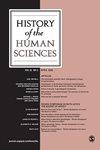“你永远不需要有鲍比在身边的分析师”:20世纪中期桑德海姆和福思音乐公司的人文科学
IF 0.5
2区 历史学
Q2 HISTORY & PHILOSOPHY OF SCIENCE
引用次数: 0
摘要
本文提供了一个科学史家如何使用音乐剧作品来理解科学思想的文化接受的案例研究。1970年,斯蒂芬·桑德海姆和乔治·弗斯的音乐剧公司在百老汇开幕。该展览涉及并反映了当代人文科学的理论和思想;Company对35岁的单身汉主角、他已婚的朋友和他的女朋友的刻画反映了当今精神分析、性学和社会学的理论。2018年,导演玛丽安·埃利奥特(Marianne Elliott)以女性为主角重启了这部剧,《公司》再次放大了围绕人类科学专业知识的当代困境——这一次是生物生育时钟。通过Company, Sondheim和forth——以及后来的elliott——构建了与当代人类科学家提出的观点相媲美的关于现代社会的论点,包括精神分析模型,孤独群体现象,以及男性和女性气质观念的转变。由于其广泛的受欢迎程度和改编的潜力,音乐剧如《公司》为分析特定历史背景下当代社会与科学专业知识之间的关系提供了一个有前途的来源基础。本文章由计算机程序翻译,如有差异,请以英文原文为准。
‘You never need an analyst with Bobby around’: The mid-20th-century human sciences in Sondheim and Furth's musical Company
This article offers a case study in how historians of science can use musical theater productions to understand the cultural reception of scientific ideas. In 1970, Stephen Sondheim and George Furth's musical Company opened on Broadway. The show engaged with and reflected contemporary theories and ideas from the human sciences; Company's portrayal of its 35-year-old bachelor protagonist, his married friends, and his girlfriends reflected present-day theories from psychoanalysis, sexology, and sociology. In 2018, when director Marianne Elliott revived the show with a female protagonist, Company once again amplified contemporary dilemmas around human sciences expertise—this time, the biological fertility clock. Through Company, Sondheim and Furth—and later Elliott—constructed arguments about modern society that paralleled those put forth by contemporary human scientists, including psychoanalytic models of the mind, the lonely crowd phenomenon, and shifting conceptions of masculinity and femininity. Because of their wide popularity and potential for readaptation, musicals such as Company offer a promising source base for analyzing the relationship between contemporary society and scientific expertise in specific historical contexts.
求助全文
通过发布文献求助,成功后即可免费获取论文全文。
去求助
来源期刊

History of the Human Sciences
综合性期刊-科学史与科学哲学
CiteScore
1.60
自引率
11.10%
发文量
31
审稿时长
>12 weeks
期刊介绍:
History of the Human Sciences aims to expand our understanding of the human world through a broad interdisciplinary approach. The journal will bring you critical articles from sociology, psychology, anthropology and politics, and link their interests with those of philosophy, literary criticism, art history, linguistics, psychoanalysis, aesthetics and law.
 求助内容:
求助内容: 应助结果提醒方式:
应助结果提醒方式:


